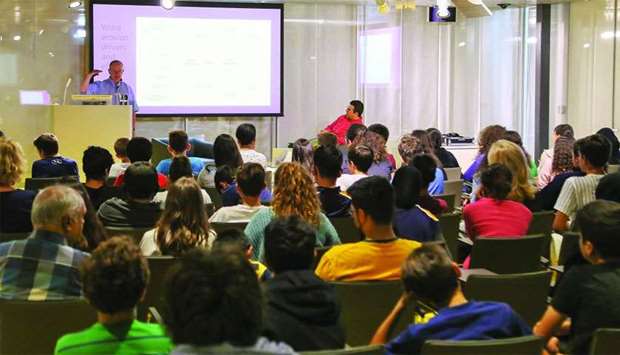Qatar National Library (QNL) organised a lecture titled "Dust Storms from Mars and Titan to Qatar", at this month's meeting of the Science Book Forum on Sunday evening.
Dr Nicholas Middleton from the School of Geography and the Environment at the University of Oxford, discussed the unique phenomena of dust storms that occur in deserts, sharing with participants their origin, evolution and how they have shaped Qatar's landscape and environment.
Offering a broad perspective, the lecture also traced how dust storms in North Africa and the Arabian Peninsula can have an environmental impact as far as the West Coast of the United States.
Dust storms also occur on other celestial bodies, such as comets, Mars and the Saturn moon, Titan.
Commenting on the impact of dust storms in Qatar, Dr Middleton, said: "If the sources of dust storms are within Qatar, it is easily preventable by building barriers and taking a variety of other measures. It becomes difficult to restrict the impact of dust storms that come from outside of Qatar, but certain measures can be taken to ameliorate their impact."
Dr Middleton added: "It is crucial for scientists and researchers to better understand the sources of dust storms and identify their impact on human society. We also need to understand how people can better mitigate their impact."
Dr Essam Heggy, Chair of the Science Book Forum, said: "The event focused on a key landscape feature of Qatar, and how dunes are being formed. The lecture gave our participants a wider understanding of the physics of dust formation and how these storms shape the landscape and contribute to shaping Qatars map."
"People need to know about this because these dust storms shape many of the environmental and economic activities in Qatar. For example, solar energy production depends on the way we understand dust formation. The longevity and sustainability of our buildings and structures also depend on the dust storms and how they erode these structures. In addition, the storms have an impact on our lives in terms of health and environmental issues," added Dr Heggy.
Qatar National Library established the Science Book Forum in 2018 to encourage reading in the scientific field in the Arab world, encourage the next generation to enroll in science and engineering studies in Qatar and the Mena region by igniting their scientific curiosity and critical thinking through reading science books, and to host public discussions on scientific books and ideas that have substantially changed human intellectual evolution, especially in areas relevant to the Arab region.

